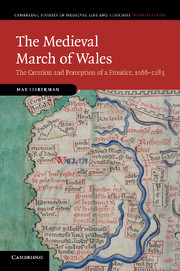Book contents
- Frontmatter
- Contents
- List of maps
- List of tables and illustration
- Preface
- List of abbreviations
- INTRODUCTION
- 1 A BORDER REGION?
- 2 THE MAKING OF A BORDER ARISTOCRACY
- 3 WARFARE AND DIPLOMACY
- 4 THE EXTENT AND NATURE OF THE MILITARY FRONTIER
- 5 THE MILITARIZATION OF SOCIETY
- 6 THE SHAPING OF ADMINISTRATIVE TERRITORIES
- 7 THE BORDER LORDSHIPS AND THE ENGLISH STATE
- CONCLUSION
- Select bibliography
- Index
1 - A BORDER REGION?
Published online by Cambridge University Press: 06 July 2010
- Frontmatter
- Contents
- List of maps
- List of tables and illustration
- Preface
- List of abbreviations
- INTRODUCTION
- 1 A BORDER REGION?
- 2 THE MAKING OF A BORDER ARISTOCRACY
- 3 WARFARE AND DIPLOMACY
- 4 THE EXTENT AND NATURE OF THE MILITARY FRONTIER
- 5 THE MILITARIZATION OF SOCIETY
- 6 THE SHAPING OF ADMINISTRATIVE TERRITORIES
- 7 THE BORDER LORDSHIPS AND THE ENGLISH STATE
- CONCLUSION
- Select bibliography
- Index
Summary
It may well be that the phrase Marchia Wallie was initially coined as a result of day-to-day political events, in the aftermath of Henry II's failed campaign of 1165. But more permanent characteristics of the Welsh borders must be considered as well: the lie of the land, say, or the patterns of communications and of human settlement. The relationship between pre-modern political frontiers and the obstacles provided by terrain was far from deterministic. Boundaries of medieval European polities were generally zonal or fragmented rather than linear, and could cut across rivers, forests or mountain ranges. They were commonly overlaid and blurred by the tenurial interests and family connections of local aristocracies. Moreover, of course, they tended to shift over time, often considerably. Nevertheless, it stands to reason that terrain may have played a role in demarcating the perceived and actual extent of Marchia Wallie. It may well be, for instance, that observers from central England would have been struck, in encountering the Welsh borders, by the transition from lower to higher land. It certainly seems possible that geographical features helped create the perception that the Welsh borders formed a distinctive region in themselves. It is therefore worth investigating how far this might have been true in the case of the original Marchia Wallie, to wit, the Powys–Shropshire borderlands.
- Type
- Chapter
- Information
- The Medieval March of WalesThe Creation and Perception of a Frontier, 1066–1283, pp. 23 - 55Publisher: Cambridge University PressPrint publication year: 2010



